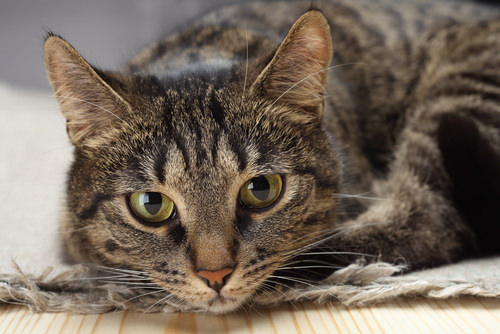
Cats get diarrhea (stool that is not formed or is softer than the usual texture) and not all cases persist and require medical intervention. Some will be self-limiting and not life threatening, but some are dangerous and it is important to know which causes are likely to be emergent. You will need to know when to be concerned and what may be the source.
Eating Something Different
When your cat eats something that is not normal for her, there can be some changes in her bowel that manifest as diarrhea. If the diarrhea does not resolve quickly (or if your cat is vomiting and acting sick), call the vet. If she has foul smelling, frequent and watery stool, she can become dehydrated by the fluid loss. She will need some medical help.
Infectious Causes
Believe it or not, cats can get stomach bugs just like people (although their viruses are not the exact same ones as humans get). Viruses and bacteria can make your cat have diarrhea. These patients sometimes have a fever also and many do not seem to feel well. Vomiting can accompany the diarrhea. Even if your cat is not around other animals, you can track infectious agents in on your shoes. If your cat is not current on his routine vaccines, diarrhea can be a very big deal because Feline Panleukopenia is a part of the routine vaccination series. This horrible disease has a very high mortality. You will need a veterinary team to help you with infectious diarrhea and only a veterinarian can help you find the cause.
Parasites
Intestinal parasites are certainly a common cause of diarrhea, especially in young cats or cats that spend time outdoors. All cats should be a comprehensive parasite control program, regardless of age and lifestyle. De-worming products that are not obtained through a veterinarian are not as effective and a deworming program should be based on results of parasite testing and not used randomly. There are several veterinary products available. Ask your veterinary professionals to help you know which are appropriate for your cat.
Metabolic Disease
Metabolic diseases are things like renal (kidney) disease, diabetes, hyperthyroidism and liver disease. The mechanism for the diarrhea is different from some of the other causes, but you will need a vet’s help and blood tests to uncover these issues. Each will have a different treatment protocol and prognosis, so getting to the root cause is essential. These cases will usually be characterized by intermittent diarrhea +/- vomiting, sometimes weight loss and are often accompanied by other signs that may not be obvious, like increased water consumption or urination. Prompt identification of these disorders is important for a better outcome.
Other Causes
There are other more complex causes of diarrhea in cats. Things including: Inflammatory Bowel Disease, gastrointestinal cancers, protozoal infection and food intolerance. There are many things that cause changes in the stool, so you will need some diagnostic help to figure these out.
These causes are so varied; they have different treatment protocols and prognoses. But as with anything, early diagnosis and treatment are the best chance for a positive outcome.
Diarrhea can be an easy treatment or a sign of serious disease, especially if it continues for more than an episode or two and your cat is acting like she feels bad (lying around and not interested in normal activities). NEVER give human medications to a cat and let your vet decide what needs to be given based on his/her exam and diagnostic results. When you go to the vet, it might be a good idea to bring along a fresh stool sample and make sure that you are able to describe your cat’s symptoms explicitly.
Diarrhea is not something that should be ignored and your cat will thank you for getting her the help she needs.
